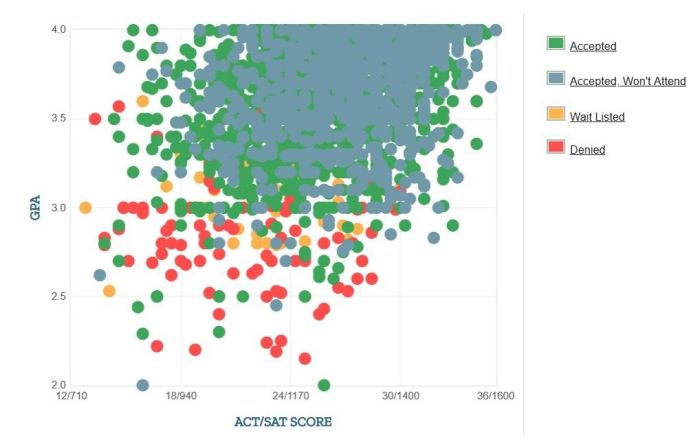Navigating the world of university admissions can be a daunting task, especially when it comes to understanding the intricate web of GPA requirements. This guide delves into the University of Oregon’s GPA requirements, providing a clear and comprehensive roadmap for prospective students eager to embark on their academic journey at this prestigious institution. From general overviews to specific program breakdowns, we’ll explore everything you need to know about meeting the GPA expectations of the University of Oregon.
The University of Oregon holds a steadfast commitment to academic excellence, and GPA serves as a crucial indicator of a student’s academic prowess and potential for success within our rigorous programs. This guide will empower you with the knowledge and strategies necessary to not only meet but exceed the GPA requirements, opening doors to a world of opportunities at the University of Oregon.
General Overview of GPA Requirements
:max_bytes(150000):strip_icc()/universityoforegon-04be0b4cf5ab42d3acbb297962e656b2.jpg?w=700)
The University of Oregon has a strong academic reputation, and GPA is an important factor in the admissions process. A high GPA demonstrates your academic ability and preparedness for the rigors of college-level coursework. It also shows that you have the discipline and motivation to succeed in your studies.
The table below Artikels the minimum GPA requirements for admission to different academic programs at the University of Oregon:
| Program | Minimum GPA |
|---|---|
| Arts and Sciences | 3.5 |
| Business | 3.7 |
| Education | 3.3 |
| Engineering | 3.8 |
| Journalism and Communication | 3.4 |
| Law | 3.9 |
| Medicine | 3.9 |
GPA is calculated by taking the average of all the grades you have earned in your coursework. All grades, including those from high school, college, and any other post-secondary institutions you have attended, are considered in the calculation.
When calculating GPA, the University of Oregon uses a 4.0 scale. This means that an A is worth 4.0 points, a B is worth 3.0 points, a C is worth 2.0 points, a D is worth 1.0 point, and an F is worth 0 points.
In addition to your overall GPA, the University of Oregon also considers your GPA in your major field of study. This is known as your major GPA. Your major GPA is calculated by taking the average of all the grades you have earned in the courses required for your major.
Both your overall GPA and your major GPA are important factors in the admissions process. A high GPA in both areas demonstrates your academic ability and preparedness for the rigors of college-level coursework.
GPA Requirements for Specific Programs
In addition to the general GPA requirements, certain academic programs at the University of Oregon have higher GPA requirements. These higher requirements are typically due to the competitive nature of the programs and the need for students to demonstrate a strong academic foundation in the relevant subject area.
Some examples of programs that require a GPA of 3.5 or above include:
Pre-Health Professions
- Pre-Medicine
- Pre-Dentistry
- Pre-Pharmacy
- Pre-Veterinary Medicine
These programs require a high GPA because they are highly competitive and students need to demonstrate a strong academic foundation in science and math.
Engineering
- Bioengineering
- Chemical Engineering
- Civil Engineering
- Computer Engineering
- Electrical Engineering
- Environmental Engineering
- Industrial Engineering
- Materials Science and Engineering
- Mechanical Engineering
These programs require a high GPA because they are highly technical and students need to demonstrate a strong academic foundation in math and science.
Business
- Accounting
- Finance
- Management
- Marketing
These programs require a high GPA because they are highly competitive and students need to demonstrate a strong academic foundation in business and economics.
Alternative Ways to Meet GPA Requirements
/GettyImages-508471395-d9ddece52152444e87a84cc1a8272f2e.jpg?w=700)
Beyond achieving the minimum GPA, students can explore alternative methods to demonstrate their academic potential and compensate for lower GPAs.
One such method is through standardized test scores. These scores can provide an objective measure of a student’s academic abilities, regardless of their GPA. For example, a high SAT or ACT score can indicate a student’s strong academic foundation and ability to perform well in college-level coursework.
Extracurricular Activities and Work Experience
In addition to standardized test scores, some programs consider extracurricular activities and work experience as factors in their admissions decisions. This is because these activities can demonstrate a student’s leadership skills, commitment, and ability to balance academic and extracurricular responsibilities.
- For example, students involved in sports, clubs, or volunteer work may have developed strong teamwork, communication, and problem-solving skills.
- Similarly, students with work experience may have gained valuable practical knowledge and demonstrated their ability to apply their academic learning in a real-world setting.
Strategies for Improving GPA
Improving your GPA requires a multifaceted approach that encompasses effective time management, efficient study habits, and proactive academic support. By implementing these strategies, you can enhance your academic performance and achieve your desired GPA.
Time Management
Time management is crucial for academic success. Create a realistic schedule that allocates time for classes, assignments, study, and breaks. Prioritize tasks based on deadlines and importance. Use a planner or calendar to track appointments and assignments. Break down large projects into smaller, manageable chunks to avoid feeling overwhelmed.
Study Habits
Effective study habits are essential for retaining information and improving your GPA. Develop a dedicated study space free from distractions. Use active learning techniques such as note-taking, flashcards, and practice questions. Spaced repetition, where you review material at increasing intervals, can enhance long-term memory. Engage with the material by asking questions, discussing it with peers, or seeking clarification from instructors.
Academic Support
Do not hesitate to seek academic support when needed. Utilize university resources such as tutoring, writing centers, and academic advising. Attend office hours to clarify concepts and ask questions. Join study groups with classmates to collaborate and share insights. Consider seeking support from a counselor or therapist if academic stress or other factors are impacting your performance.
Consequences of Not Meeting GPA Requirements
/university-of-oregon-gpa-sat-act-57d05ecf3df78c71b627db57.jpg?w=700)
Failing to meet the GPA requirements for the University of Oregon or specific programs can have several potential consequences.
Firstly, students who do not meet the minimum GPA may be denied admission to the university or their desired program. This can be a significant setback, especially for those who have worked hard to prepare for college and have set their sights on a particular degree or institution.
Alternative Pathways
However, it’s important to note that not meeting GPA requirements does not necessarily mean the end of a student’s academic journey. There are alternative pathways available for students who wish to pursue higher education.
- Community College: Students can enroll in a community college and take courses to improve their GPA. After completing the necessary coursework, they may be able to transfer to the University of Oregon or another four-year institution.
- Academic Renewal: Some universities offer academic renewal programs that allow students to retake courses and have the previous grades removed from their transcript. This can be an option for students who have experienced extenuating circumstances that have impacted their academic performance.
- Special Admissions: Some universities have special admissions programs for students who do not meet the traditional GPA requirements. These programs may consider other factors, such as extracurricular activities, work experience, or personal statements.
Essential FAQs
What is the minimum GPA required for admission to the University of Oregon?
The minimum GPA requirement for admission to the University of Oregon is 3.0 on a 4.0 scale.
Are there any specific academic programs that have higher GPA requirements?
Yes, certain academic programs at the University of Oregon have higher GPA requirements. These programs include the College of Arts and Sciences, the Lundquist College of Business, and the School of Law.
Can I use standardized test scores to compensate for a lower GPA?
Yes, the University of Oregon considers standardized test scores when evaluating applicants. High test scores can help offset a lower GPA.
What are some strategies for improving my GPA?
Effective strategies for improving GPA include effective time management, developing strong study habits, and seeking academic support when needed.
What are the consequences of not meeting the GPA requirements?
Not meeting the GPA requirements may result in denial of admission to the University of Oregon or specific academic programs. However, there are alternative pathways available for students who do not meet the GPA requirements.




